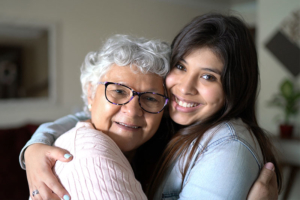
Different types of dementia share similar symptoms, but need different treatment.
A senior who exhibits loss of memory, confusion, poor judgment, repetition, and problems with performing daily activities has the distinguishing signs of Alzheimer’s disease, right? Actually, what appears to be a clear case of Alzheimer’s may really be one of several different types of dementia – in particular, one that has just recently been identified.
Known as LATE, or limbic-predominant age-related TDP-43 encephalopathy, this diagnosis has nearly identical symptoms, but the underlying cause is another story. Instead of the buildup of amyloid plaques and tangles inherent in Alzheimer’s, LATE is diagnosed by deposits of TDP-43 protein, as reported by Dr. Julie Schneider, associate director for the Rush Alzheimer’s Disease Center.
And TDP-43 protein troubles happen to be quite common in elderly people, with as many as one in four people over age 85 affected enough to cause noticeable cognitive and/or memory issues. Yet it remains an under-diagnosed condition, which could result in misdiagnoses, and therefore, inappropriate treatment.
The newest guidelines call for people who have been determined to have LATE to be pulled from Alzheimer’s medication research, concentrating research alternatively on establishing biomarkers to better recognize LATE, to find therapeutic intervention methods, and to expand testing to include a wider variety of diverse populations, in order to improve both prevention and treatment.
Becoming familiar with the different types of dementia is vital to proper treatment, and according to Dr. James Pickett, head of research at the Alzheimer’s Society, “This evidence may also go some way to help us understand why some recent clinical trials testing for Alzheimer’s disease have failed – participants may have had slightly different brain diseases.”
Key aspects of LATE include:
- Mainly affecting seniors over age 80
- A much slower advancement than Alzheimer’s
- Usually only affects memory
- Could be accompanied by Alzheimer’s disease, which leads to a far more rapid decline
Whether Alzheimer’s disease, LATE, or some other type of dementia, Responsive Home Care, providing home and dementia care in Hollywood, FL and surrounding areas, offers the fully customized, skilled and creative caregiving that helps seniors live the best possible quality of life where it’s most comfortable: at home. Our care aides are fully trained and experienced in assisting individuals diagnosed with dementia, along with helping family caregivers to more fully manage the varying difficulties experienced in each stage.
Contact us any time at 954-486-6440 to inquire about more dementia care resources, discover answers to your questions, or to schedule an in-home consultation to find how we can assist someone you love with dementia care in Fort Lauderdale, FL or the surrounding areas. Visit our Service Area page to view the locations that we serve.




 If your child suddenly developed an illness, who would you call? It’s a no-brainer; many parents have the number on speed dial for the pediatrician they have carefully selected to oversee the medical care needs of their children. Due to their specialized training, working with a trusted pediatrician ensures the best possible care.
If your child suddenly developed an illness, who would you call? It’s a no-brainer; many parents have the number on speed dial for the pediatrician they have carefully selected to oversee the medical care needs of their children. Due to their specialized training, working with a trusted pediatrician ensures the best possible care.
 Life, especially but not just during the pandemic, can be filled with uncertainty. For seniors who are feeling less in command of particular facets of life, such as losing physical or cognitive functioning, concentrating on what can be controlled is empowering.
Life, especially but not just during the pandemic, can be filled with uncertainty. For seniors who are feeling less in command of particular facets of life, such as losing physical or cognitive functioning, concentrating on what can be controlled is empowering. A new study sponsored by the Alzheimer’s Association is uncovering some striking findings in how dementia may present differently in Hispanic people. While additional exploration is required to fully understand whether these differences are the result of social/cultural nuances or perhaps the dementia itself, it’s worthwhile information for Latino families to know.
A new study sponsored by the Alzheimer’s Association is uncovering some striking findings in how dementia may present differently in Hispanic people. While additional exploration is required to fully understand whether these differences are the result of social/cultural nuances or perhaps the dementia itself, it’s worthwhile information for Latino families to know.



